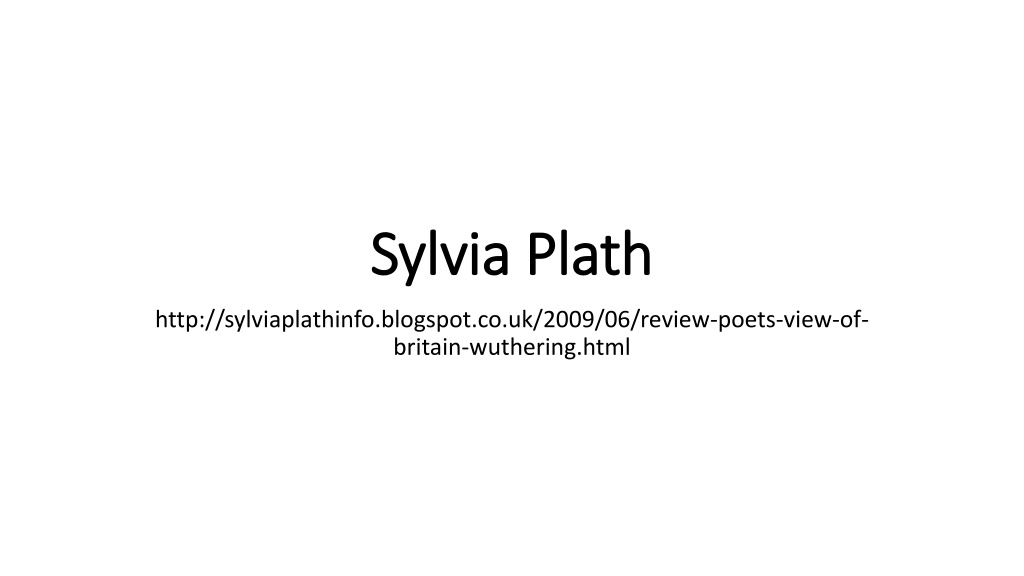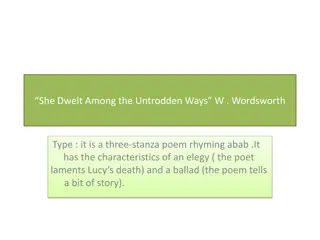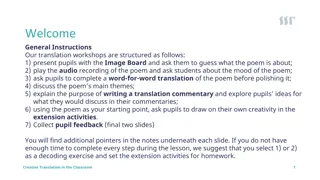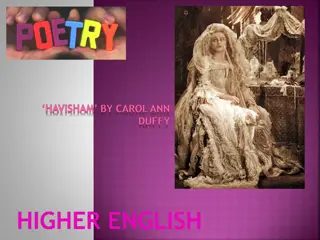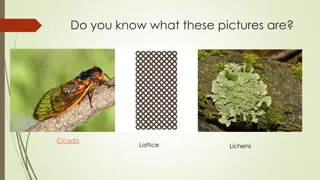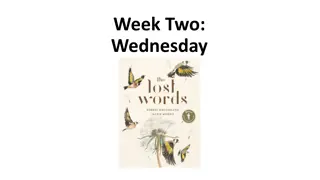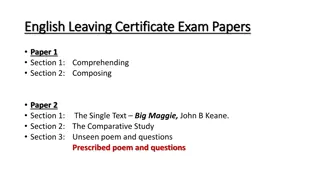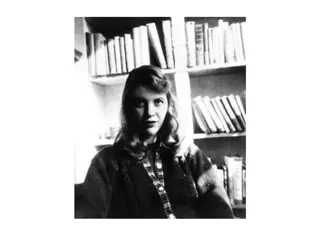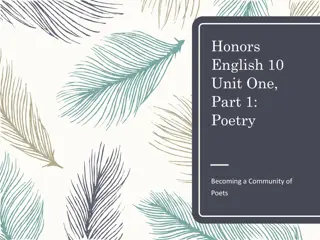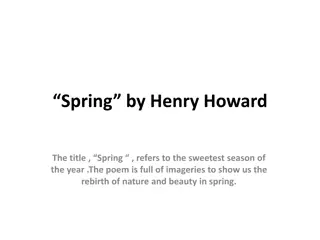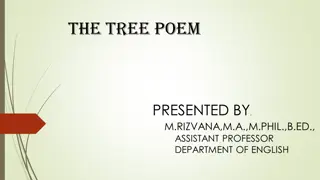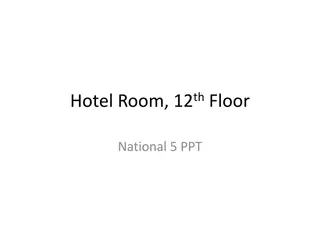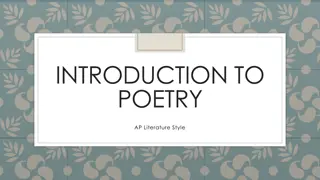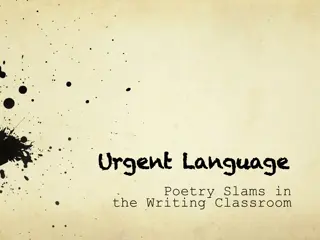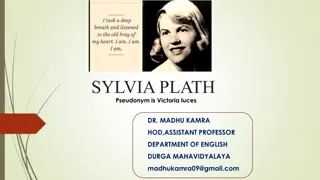Analysis of Sylvia Plath's Poem "Blackberrying" with Poetic Techniques
Delve into Sylvia Plath's poem "Blackberrying" as it explores the experience of picking blackberries and the deeper themes it conveys. The analysis covers poetic techniques such as metaphor, imagery, and symbolism to uncover the meaning and effects the poet aims to evoke through her words.
Download Presentation

Please find below an Image/Link to download the presentation.
The content on the website is provided AS IS for your information and personal use only. It may not be sold, licensed, or shared on other websites without obtaining consent from the author. Download presentation by click this link. If you encounter any issues during the download, it is possible that the publisher has removed the file from their server.
E N D
Presentation Transcript
Sylvia Plath Sylvia Plath http://sylviaplathinfo.blogspot.co.uk/2009/06/review-poets-view-of- britain-wuthering.html
Blackberrying Blackberrying Nobody in the lane, and nothing, nothing but blackberries, Blackberries on either side, though on the right mainly, A blackberry alley, going down in hooks, and a sea Somewhere at the end of it, heaving. Blackberries Big as the ball of my thumb, and dumb as eyes Ebon in the hedges, fat With blue-red juices. These they squander on my fingers. I had not asked for such a blood sisterhood; they must love me. They accommodate themselves to my milkbottle, flattening their sides.
Overhead go the choughs in black, cacophonous flocks Bits of burnt paper wheeling in a blown sky. Theirs is the only voice, protesting, protesting. I do not think the sea will appear at all. The high, green meadows are glowing, as if lit from within. I come to one bush of berries so ripe it is a bush of flies, Hanging their bluegreen bellies and their wing panes in a Chinese screen. The honey-feast of the berries has stunned them; they believe in heaven. One more hook, and the berries and bushes end.
The only thing to come now is the sea. From between two hills a sudden wind funnels at me, Slapping its phantom laundry in my face. These hills are too green and sweet to have tasted salt. I follow the sheep path between them. A last hook brings me To the hills northern face, and the face is orange rock That looks out on nothing, nothing but a great space Of white and pewter lights, and a din like silversmiths Beating and beating at an intractable metal.
Task Task As we go through each of the poems, make a note of any poetic techniques you see, and what meaning and effect the writer is trying to convey by using these. Each group member will be responsible for a section of the poem, and you will then teach the other members in the group about that section. You must come up with as much detailed analysis of these lines as you can. Remember, it s not enough to say that something is a metaphor WHAT does that metaphor suggest to us? HOW does it do that? Work through the textual analysis table to help develop the depth and variation of your analysis. YOU HAVE FIFTEEN MINUTES Social Skill: Ensuring we all contribute effectively to the group.
Task Task Using the notes you have taken on your own section, each of you will now teach the members in the group about the work you have done. Remember: - What TECHNIQUES does the writer use? - What MEANING do these convey? - HOW do they convey that meaning? YOU HAVE FIFTEEN MINUTES Social Skill: Ensuring we all contribute effectively to the group.
Task Task Using the notes you have taken on the poem so far, analyse and write up some notes on how the poem explores the following ideas/themes: - The sublime, i.e. the speaker s awareness of her own smallness compared to nature s grandeur. - Consciousness of the fragility of life. - The journeys taken throughout the poem. - The role of nature in exploring wider themes.
Textual Analysis Textual Analysis By examining key poetic techniques, how does Plath explore the fragility of life in Blackberrying ? Task PLAN a response to the above question. This response can be an extended essay or a series of developed bullet points. Tips Have a CLEAR argument from the very beginning what are you trying to say about how Plath explores this fragility? E.g. she does this by examining the balance between life and death, or by using a metaphorical journey of the stages of life, or by using The Sublime to highlight her own sense of fragility in the face of nature s power. Be certain in your analysis don t be unsure, or you ll convince no one. It s better to analyse less in detail, than more and just skate on the surface.
Textual Analysis Textual Analysis By examining key poetic techniques, how does Plath explore the fragility of life in Blackberrying ? Task WRITE a response to the above question. This response can be an extended essay or a series of developed bullet points. YOU WILL HAVE AN HOUR AND A HALF OVER TODAY AND TOMORROW
Sleep in the Mojave Desert Out here there are no hearthstones, I think of the lizards airing their tongues Hot grains, simply. It is dry, dry. And the air dangerous. Noonday acts queerly On the mind's eye erecting a line Of poplars in the middle distance, the only Object beside the mad, straight road One can remember men and houses by. A cool wind should inhabit these leaves And a dew collect on them, dearer than money, In the blue hour before sunup. In the crevice of an extremely small shadow And the toad guarding his heart's droplet. The desert is white as a blind man's eye, Comfortless as salt. Snake and bird Doze behind the old masks of fury. We swelter like firedogs in the wind. The sun puts its cinder out. Where we lie The heat-cracked crickets congregate In their black armorplate and cry. Yet they recede, untouchable as tomorrow, Or those glittery fictions of spilt water That glide ahead of the very thirsty. The day-moon lights up like a sorry mother, And the crickets come creeping into our hair To fiddle the short night away.
Task Task Discuss and make notes on how Plath explores the below themes in Blackberrying and Sleep in the Mojave Desert : Isolation The speaker s relationship with nature/the natural world The sublime, i.e. the speaker s awareness of her own smallness compared to nature s grandeur. The fragility of life
Presentation Presentation How does Plath explore the below themes in Blackberrying and Sleep in the Mojave Desert ? Isolation The speaker s relationship with nature/the natural world The role of nature in exploring wider themes The fragility of life The sublime, i.e. the speaker s awareness of her own smallness compared to nature s grandeur.
Task Task Discuss and explore the use of PROSODY in Blackberrying and Sleep in the Mojave Desert, and the meaning that it suggests. You should take notes throughout your discussion.
Arrival of the Bee Box Arrival of the Bee Box In this poem, Sylvia Plath expresses a desire to be in control, and feels she has to deal with a dangerous situation. At first she is not in control. She panics. She has a debate with herself and then she makes a calm decision. As you analyse the poem, remember to focus on PROSODY as well as her use of language: Alliteration Consonance Sibilance Onomatopoeia Assonance Rhyming Internal Rhyme Cross Rhyme Rhythm
Plath and Dissolution of the Self Plath and Dissolution of the Self Kenneth Gergen sarticle The Dissolution of Self focuses on the individual within a social group. Gergen s argument in the article is that our view of the individual in terms of identity/individualism is actually a result of the social saturation, interpreted as- people are a product of their environment. The certain groups that we have become acclimated to over time are what shape our own personal identity by different values and characteristics that we might have. Gergen argues that because of this process of socialization, we in fact do not have an actual self but rather a personality that reflects our experiences in society. When the known patterns dissipate, the masks of the false self come off, revealing us as real, vulnerable, and stripped of facades and illusions.
Task Task Using your notes on Blackberrying , Sleep in the Mojave Desert and Arrival of the Bee Box , you are going to plan a response to the below question. We will write this over a couple of lessons next week. With reference to at least three poems by a particular poet, discuss the effectiveness of the poet s use of nature and the natural world in the presentation of significant themes and ideas. TIPS: Establish a clear overall argument in your introduction and always come back to it. Analyse one theme at a time, and don t try to do too many two is more than enough. Ensure you compare and contrast the poems throughout where are there similarities or differences in the use of language, imagery, symbolism, narrative stance, etc. Technical accuracy is not optional at this level.
Two Campers in Cloud Country Two Campers in Cloud Country (Rock Lake, Canada) (Rock Lake, Canada) In this country there is neither measure nor balance To redress the dominance of rocks and woods, The passage, say, of these man-shaming clouds. No gesture of yours or mine could catch their attention, No word make them carry water or fire the kindling Like local trolls in the spell of a superior being. Well, one wearies of the Public Gardens: one wants a vacation Where trees and clouds and animals pay no notice; Away from the labelled elms, the tame tea-roses.
It took three days of driving north to find a cloud The polite skies over Boston couldn t possibly accommodate. Here on the last frontier of the big, brash spirit The horizons are too far off to be chummy as uncles; The colors assert themselves with a sort of vengeance. Each day concludes in a huge splurge of vermilions* And night arrives in one gigantic step. It s comfortable, for a change, to mean so little. These rocks offer no purchase to herbage or people: *bright red pigment or colour
They are conceiving a dynasty of perfect cold. In a month we ll wonder what plates and forks are for. I lean to you, numb as a fossil. Tell me I m here. The Pilgrims and Indians might never have happened. Planets pulse in the lake like bright amoebas; The pines blot our voices up in their latest sighs. Around our tent the old simplicities sough* Sleepily as Lethe*, trying to get in. We ll wake blank-brained as water in the dawn. *1 a moaning, whistling, or rushing sound as made by the wind in the trees or the sea *2 Greek spirit of forgetfulness and oblivion/concealment
Two Campers in Cloud Country Two Campers in Cloud Country Discuss and answer these questions in detail in your groups. Be ready to feedback. 1. Describe the tone of the poem. What is the speaker s attitude toward the fact that there is neither measure nor balance/To redress the dominance of rocks and woods ? 2. Discuss the use of sound devices (e.g. alliteration, consonance, assonance, and onomatopoeia) in the poem. Find a few specific examples and discuss their effect. 3. In what sense could the clouds be man-shaming (line 3)? Why is the speaker unable to catch their attention (line 4)? 4. What connotation do the words labelled, tame, polite, and chummy have in lines 9-13? 5. Why do you think the speaker will wonder what plates and forks are for (line 20)? 6. What do you think the old simplicities (line 25) might be, and what does it mean to be blankbrained (line 27)? What rhetorical devices are contained in lines 25-26?
Plath and Dissolution of the Self Plath and Dissolution of the Self Kenneth Gergen sarticle The Dissolution of Self focuses on the individual within a social group. Gergen s argument in the article is that our view of the individual in terms of identity/individualism is actually a result of the social saturation, interpreted as- people are a product of their environment. The certain groups that we have become acclimated to over time are what shape our own personal identity by different values and characteristics that we might have. Gergen argues that because of this process of socialization, we in fact do not have an actual self but rather a personality that reflects our experiences in society. When the known patterns dissipate, the masks of the false self come off, revealing us as real, vulnerable, and stripped of facades and illusions.
Thematic Analysis Thematic Analysis When we write a literary study response, we need to try to avoid just describing each poem in turn we need to be COMPARATIVE in our approach. One good way to do that is through thematic analysis, where our structure is based on a paragraph per theme, and we explore each poem in that paragraph. Task Using your knowledge of the poems we have studied so far, compile notes on how each poem explores the following themes: Isolation The Sublime Nihilism (obsession with nothingness) Belonging Dissolution of the Self Longing/Desire
Two Campers in Cloud Country Two Campers in Cloud Country Using your notes on this so far, and those on the other poems, identify SIMILAR and CONTRASTING language used in this and the other poems. Write a detailed paragraph exploring how Two Campers compares/contrasts with TWO of the other poems in their exploration of one of the themes we have discussed: Isolation The Sublime Nihilism (obsession with nothingness) Belonging Dissolution of the Self Longing/Desire
Discussion Questions Discussion Questions In your groups, discuss and take notes on the following questions: 1. Should Sylvia Plath be considered a confessional poet, or does her work challenge that designation? 2. I like (or do not like) to read the poetry of Sylvia Plath. Respond to this statement, referring to the poetry of Plath we have studied thus far. 3. It startles me still . . . Discuss Sylvia Plath s relationship with the world around her. Support your points with reference to the poetry we have studied. 4. Discuss Plath s awareness of mortality in her poetry. 5. How do Plath s landscape poems present a realistic portrayal of the settings they are describing? Based on what you know of Plath, what do they tell us about her as a poet?
Some people think it's holding on that makes one strong- sometimes it's letting go. Evaluate the extent in which you agree or disagree with the statement above in light of three or four of Plath s poems.
Romanticism in Plath Romanticism in Plath feelings, emotions, and imagination take priority over logic and facts ("Anything you want you can have if you only want it enough." cf. romance narrative) belief in children's innocence and wisdom; youth as a golden age; adulthood as corruption and betrayal nature as beauty and truth, esp. the sense of nature as the sublime (god-like awesomeness mixing ecstatic pleasure mixed with pain, beauty mixed with terror) heroic individualism; the individual separate from the masses "outsiders" as representatives of special worth excluded by rigid societies or irrational norms nostalgia for the past desire or will as personal motivation intensification, excess, and extremes common people idealised as dependable source of true common sense and sentiment idealised or abstract settings; characters as symbolic types the gothic as nightmare world of intense emotions and complex psychology
Gothic in Plath Gothic in Plath The gothic is a genre or style of literature that keeps showing up throughout Western literary history from visions of hell to the novels of Stephen King though it often goes by names like "horror," "terror," "thriller," the grotesque or macabre, and it has many diverse features or elements (all of which may not appear in every text): haunted houses / castles / woods, mazes; labyrinths; closed doors & secret passages / rooms light and dark interplay with shades of gray or blood-red colours; fair & dark ladies twinning; doubling; doppelgangers repressed fears & desires; memory of past crime or sin; death & decay; bad-boy Byronic heroes blood as visual spectacle and genealogy / ethnicity; spectral or grotesque figures; lurid symbols creepy or startling sounds, e.g. screams in the night, groans from unknown rooms
Gothic in Plath Gothic in Plath The indispensable feature of nearly any gothic narrative is a haunted space that reflects or corresponds to a haunted mind. In European literature the gothic space is typically a haunted castle or other architectural structure such as a maze or labyrinth. Psychological / cultural projections of the gothic: Especially in Poe but also in Bronte's Jane Eyre and other gothic fiction, the haunted space appears as a correspondence or projection of a haunted mind. This psychological reading of the gothic would account for the style's persistence across various periods, media, and cultures. The darkness and irrationality of the gothic villain or setting may sometimes serve as a convenient characterization of the Other or the Unknown. For instance, in Charlotte Bronte's Jane Eyre (1847) the Creole woman Bertha from the Caribbean is characterised in terms of gothic darkness and uncontrolled passion and depravity, in contrast to the pale, English, and restrained Jane. Comparably, in early American literature Native American Indians are sometimes described as "black" or "dark" figures holding satanic ceremonies in the night. Though demonic elements of the gothic are easily observed, more positive spiritual elements often escape attention. The gothic's darkness depends on a corresponding light; the fair lady must be offset by a dark lady. Fascination with darkness requires an idea of light.
Gothic in Plath Gothic in Plath The Wilderness Gothic Gothic literature in the early United States faced a peculiar problem with settings, however. European gothic tales typically featured a mysterious mansion, castle, or abbey. The American landscape had few or none of these ancient buildings with time-haunted memories of crime and betrayal. So American writers used the American landscape: Imagination peoples the unknown with threats that are symbolized by familiar images for European colonists and their descendants, such threatening images might be darkness, demons, the innocent imperilled. Early European-American settlers sometimes regarded the New World as "the Devil's Territories" (Cotton Mather) and the Native Americans as either serving the devil, or devils themselves. And then there's the guilt of repressed crime or sin that the gothic explores. America's original sin may have been taking the land from its original inhabitants and reducing them through disease, war, and exploitation.
Discussion Discussion Where are there elements of the Romantic and Gothic in Plath s poetry? Ensure you make specific reference to the poems we have studied.
Wuthering Heights Wuthering Heights The horizons ring me like faggots, Tilted and disparate, and always unstable. Touched by a match, they might warm me, And their fine lines singe The air to orange Before the distances they pin evaporate, Weighting the pale sky with a soldier color. But they only dissolve and dissolve Like a series of promises, as I step forward.
There is no life higher than the grasstops Or the hearts of sheep, and the wind Pours by like destiny, bending Everything in one direction. I can feel it trying To funnel my heat away. If I pay the roots of the heather Too close attention, they will invite me To whiten my bones among them.
The sheep know where they are, Browsing in their dirty wool-clouds, Grey as the weather. The black slots of their pupils take me in. It is like being mailed into space, A thin, silly message. They stand about in grandmotherly disguise, All wig curls and yellow teeth And hard, marbly baas.
I come to wheel ruts, and water Limpid as the solitudes That flee through my fingers. Hollow doorsteps go from grass to grass; Lintel and sill have unhinged themselves. Of people the air only Remembers a few odd syllables. It rehearses them moaningly: Black stone, black stone.
The sky leans on me, me, the one upright Among the horizontals. The grass is beating its head distractedly. It is too delicate For a life in such company; Darkness terrifies it. Now, in valleys narrow And black as purses, the house lights Gleam like small change.
Wuthering Heights Wuthering Heights Free verse and enjambment reflecting the freedom of nature Slow rhythm as she walks through the moors Each stanza focuses on a particular element of the landscape The landscape is a reflection of her mind Wuthering Heights the moors take on a bewitching effect Pathetic fallacy weather reflects her mood Focus on I as she tries to assert herself
Task Task As we go through each of the poems, make a note of any poetic techniques you see, and what meaning and effect the writer is trying to convey by using these. Each group member will be responsible for a section of the poem, and you will then teach the other members in the group about that section. You must come up with as much detailed analysis of these lines as you can. Remember, it s not enough to say that something is a metaphor WHAT does that metaphor suggest to us? HOW does it do that? Work through the textual analysis table to help develop the depth and variation of your analysis. YOU HAVE FIFTEEN MINUTES Social Skill: Ensuring we all contribute effectively to the group.
Task Task Using the notes you have taken on your own section, each of you will now teach the members in the group about the work you have done. Remember: - What TECHNIQUES does the writer use? - What MEANING do these convey? - HOW do they convey that meaning? YOU HAVE TWENTY MINUTES Social Skill: Ensuring we all contribute effectively to the group.
Wuthering Heights Wuthering Heights Sylvia Plath is a poet of landscape and seascape but in several of her poems she transforms these landscapes and seascapes into unique and harrowing territories. How far do you agree? You should support your answer with evidence drawn from three or four of her other poems. Today: Plan a response to this question, which you will begin writing on Monday. Remember the feedback you received on your previous literary study response.
Wuthering Heights Wuthering Heights Write a critical analysis of this poem. In your analysis of the poem, you should comment upon those features of the poem you find interesting and significant about word choice and imagery, structure and sound, mood and tone. Your evaluation should be based on key aspects of form and structure language and imagery mood and atmosphere any other literary or rhetorical device you consider to be important. IN THIS TASK, YOU DECIDE WHAT YOU WILL FOCUS ON THEME, NARRATIVE VOICE, ETC. e.g. how the poet examines the speaker s relationship with the natural world OR how the poem explores the theme of the sublime OR how the natural world is used as extended metaphor for the speaker's own sense of conflict.
Example Introduction Example Introduction It can be said that Sylvia Plath s nature poetry often presents landscapes as unique and harrowing territories , and certainly this is true to an extent. Often, she uses these landscapes as a means of exploring her speaker s sense of self and identity or lack thereof. In her use of the Sublime, and themes of nihilism and isolation, Plath s landscapes actually become mindscapes as she explores a dissolution of the self. In fact, it is only when her speaker appears at peace with her insignificance in the face of nature s power, that the landscapes move from a somewhat disturbing and stressing setting, to somewhere where she feels she can openly admire the grandeur of nature, comfortable in her sense of self.
Winter Trees Winter Trees The wet dawn inks are doing their blue dissolve. On their blotter of fog the trees Seem a botanical drawing. Memories growing, ring on ring, A series of weddings. Each person should analyse ONE STANZA in detail think techniques, meaning, but also where we see elements of the Gothic style in this piece. Once you are ALL done, discuss your findings with your group, each adding to your notes and annotations. Consider the following themes: Memories The roles of women The use of Greek mythology and Christian imagery what do these allusions mean? The endurance of suffering. Knowing neither abortions nor bitchery, Truer than women, They seed so effortlessly! Tasting the winds, that are footless, Waist-deep in history. Full of wings, otherworldliness. In this, they are Ledas. O mother of leaves and sweetness Who are these pietas? The shadows of ringdoves chanting, but chasing nothing.
Winter Trees Winter Trees The wet dawn inks are doing their blue dissolve. On their blotter of fog the trees Seem a botanical drawing. Memories growing, ring on ring, A series of weddings. Knowing neither abortions nor bitchery, Truer than women, They seed so effortlessly! Tasting the winds, that are footless, Waist-deep in history. Full of wings, otherworldliness. In this, they are Ledas. O mother of leaves and sweetness Who are these pietas? The shadows of ringdoves chanting, but chasing nothing.
Task Task Write a critical analysis of ONE of Plath s poems which we have studied. In your analysis of the poem, you should make clear what you find interesting and significant about: word choice imagery structure sound mood tone Have a CLEAR OVERALL ARGUMENT.
Literary Study Task Literary Study Task The poet too often presents us with a view of the world which is bleak and lacking in any sort of consolation. To what extent do you agree? You should refer to three poems. OR Compare and contrast the treatment of identity (personal, cultural, political ) in three poems. Today: Plan a response to ONE of these questions, which you will begin writing on Monday under timed conditions (i.e. 90 minutes). Remember the feedback you received on your previous literary study response.
Ariel Ariel Stasis in darkness. Then the substanceless blue Pour of tor and distances. God s lioness, How one we grow, Pivot of heels and knees! The furrow Splits and passes, sister to The brown arc Of the neck I cannot catch,
Nigger-eye Berries cast dark Hooks Black sweet blood mouthfuls, Shadows. Something else Hauls me through air Thighs, hair; Flakes from my heels. White Godiva, I unpeel Dead hands, dead stringencies.
And now I Foam to wheat, a glitter of seas. The child s cry Melts in the wall. And I Am the arrow, The dew that flies Suicidal, at one with the drive Into the red Eye, the cauldron of morning.
In her poetry Plath observes the natural, living world with a horrified fascination bordering on revulsion; the absence of life is a chilling, but attractive, alternative. Discuss three or four of Plath s poems in the light of this assertion. Many of Plath s poems are preoccupied with the inevitability of loss. Discuss Plath s treatment of the inevitability of loss in three or four of her poems.
Example Literary Study Questions Example Literary Study Questions Poetry emerges when a poet transforms the experience of the natural world into a reflection on our place in that world. To what extent do you agree? In your answer you should refer to three poems. Light and dark, pleasure and pain, ugliness and beauty Discuss the treatment of contrast in three poems. Compare and contrast the treatment of the natural world in three poems. Compare and contrast the treatment of identity (personal, cultural, political ) in three poems.
